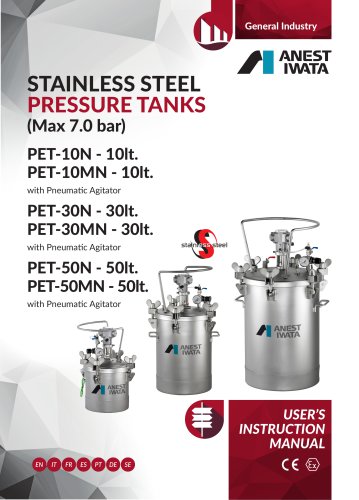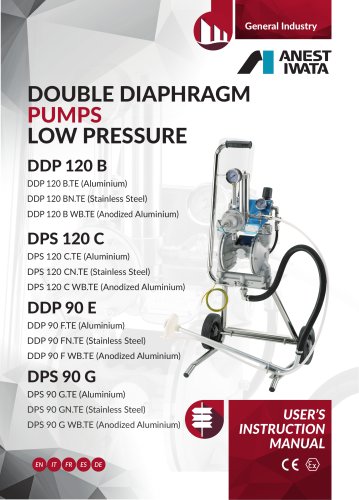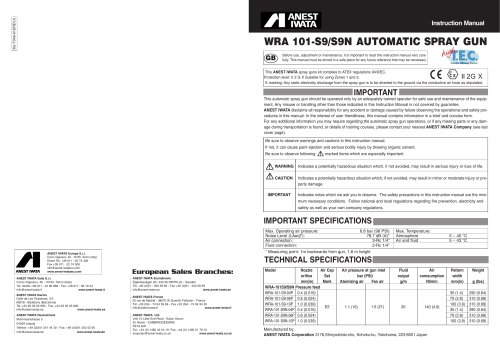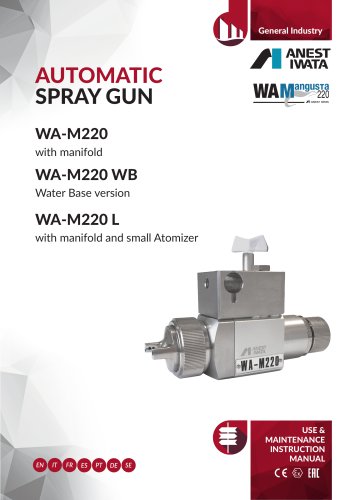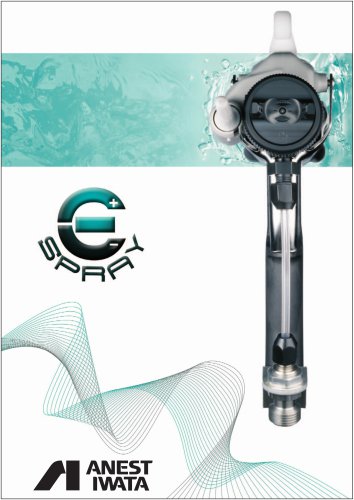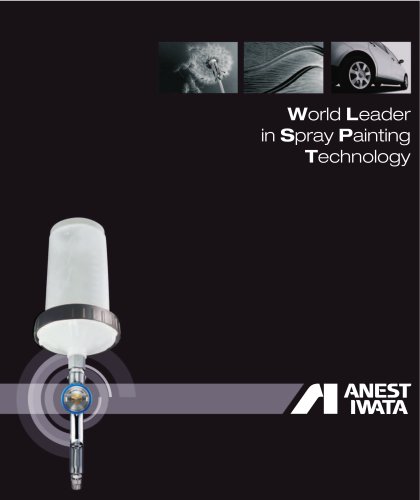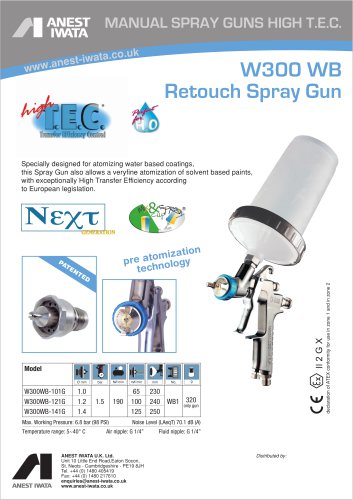
Catalog excerpts
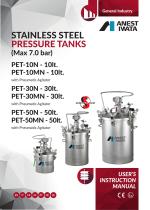
General Industry STAINLESS STEEL PRESSURE TANKS (Max 7.0 bar) USER’S INSTRUCTION MANUAL EN
Open the catalog to page 1
PET Series | Stainless Steel Pressure Tanks PET Series | Stainless Steel Pressure Tanks USE OF THE MANUAL This use and maintenance manual is an integral part of the equipment and must be easily available to the staff in charge of its use and maintenance. The user and the personnel in charge of maintenance must be aware of the contents of this manual. Read the manual carefully before starting ANY ACTIVITY involving the equipment, including its handling. USER'S INSTRUCTION MANUAL MANUALE DI ISTRUZIONI D'USO MANUEL D’INSTRUCTIONS D'EMPLOI THE ORIGINAL CONFIGURATION OF THE EQUIPMENT MUST NOT BE...
Open the catalog to page 2
PET Series | Stainless Steel Pressure Tanks PET Series | Stainless Steel Pressure Tanks THE TECHNICAL FEATURES OF THE VARIOUS MODELS ARE LISTED IN PARAGRAPH 2.3. The tank is composed of two main parts: the body and the lid. The equipment described in this manual is a Stainless Steel Pressure Tank PET model for paint spraying systems. The pressure inside the tank allows spraying the paint with a pressure between 0 and 7 bar (700 kpa). The possibility to adjust the product pressure improves the quality of application and facilitates the flow of highly viscous products. The body of the tank is...
Open the catalog to page 3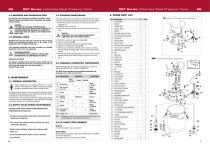
PET Series | Stainless Steel Pressure Tanks An improper earth connection, insufficient ventilation, naked flames or sparks can produce fires or explosions and produce serious damage. For a good upkeep of all our equipment, and therefore of their components, we recommend cleaning them thoroughly as often as possible. 1. Release the pressure according to the indications provided in paragraph 4.2. 2. Remove the lid from the tank. 3. Empty the paint from the tank, and then pour the cleaning liquid into it. CAUTION MAKE SURE THAT THE CLEANING LIQUID USED IS COMPATIBLE WITH THE PAINTS SPRAYED....
Open the catalog to page 4
PET Series | Stainless Steel Pressure Tanks 7. TROUBLESHOOTING NOTE: The symbol (!) means that before starting the procedure it is necessary to release pressure (see paragraph 4.2) PET Series | Stainless Steel Pressure Tanks ANOMALY POSSIBLE CAUSE CHECK POINTS Damaged pressure gauge. POSSIBLE CAUSE CHECK POINTS Twisted or obstructed air hose and couplings. Remove any restriction to the air flow. (!) The two-way air inlet valve is closed. Insufficient air source pressure. Improper adjustment of the air pressure regulator. Fluid passages between the fluid outlet joint and the suction pipe....
Open the catalog to page 5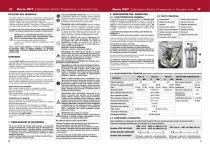
Serie PET | Serbatoi Sotto Pressione in Acciaio Inox UTILIZZO DEL MANUALE Il presente manuale di istruzioni e manutenzione costituisce parte integrante dell’apparecchiatura e deve essere facilmente reperibile dal personale addetto all’uso e alla manutenzione della stessa. L’utente e l’addetto alla manutenzione hanno l’obbligo di conoscere il contenuto del presente manuale. Le descrizioni e le illustrazioni contenute nella presente pubblicazione si intendono non impegnative. E’ richiesta la lettura del manuale prima che venga intrapresa QUALSIASI ATTIVITA’ che coinvolga l’apparecchiatura...
Open the catalog to page 6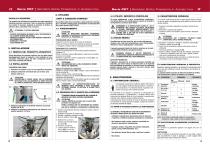
Serie PET | Serbatoi Sotto Pressione in Acciaio Inox 4. UTILIZZO LIMITI E CONDIZIONI D’IMPIEGO Per garantire che all’interno del serbatoio non venga superata la massima pressione di esercizio (7 bar), sul coperchio è installata una valvola di sicurezza. Superata la pressione di taratura la valvola si apre, scaricando l’aria in eccesso. Una modifica della forma costruttiva o della posizione di montaggio è consentita soltanto previa consultazione ed autorizzazione del servizio tecnico ANEST IWATA. - SOLVENTI IDROCARBURI ALOGENATI, QUALI TRICLORUROETANO, CLORURO DI METILENE O SIMILI. -...
Open the catalog to page 7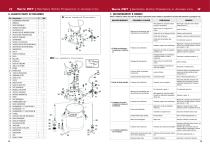
Serie PET | Serbatoi Sotto Pressione in Acciaio Inox Descrizione GUARNIZIONE COPERCHIO MANIGLIA DADO ESAGONALE VALVOLA DI SCARICO RACCORDO A 90° VALVOLA DUE VIE (INGRESSO ARIA) REGOLATORE PRESSIONE ARIA DADO DI FISSAGGIO GUARNIZIONE VALVOLA DI SICUREZZA VALVOLA DUE VIE (USCITA MATERIALE) ADATTATORE USCITA MATERIALE MANOMETRO STELO DADO DI FISSAGGIO ELICA BULLONE RONDELLA DADO DI CHIUSURA ANELLO DI FERMO PERNO PERNO (SUS) TUBO DI ASPIRAZIONE CAMPANA FILTRO BASE FILTRO FILTRO MOLLA FILTRO GUIDA FLUSSO ARIA VITE ESAGONALE RONDELLA ELASTICA TAPPO DI CHIUSURA MOTORE PNEUMATICO SPINA VITE...
Open the catalog to page 8
Serie PET | Serbatoi Sotto Pressione in Acciaio Inox POSSIBILI CAUSE Serie PET | Réservoirs Sous Pression en Acier Inox EMPLOI DU MANUEL Manometro danneggiato. Valvola di sicurezza danneggiata o difettosa. Pressione di scarico errata. Valvola di sicurezza ostruita. Pressione di scarico errata. Allentamento serraggio bulloni. Serrare saldamente ed uniformemente tutti i bulloni di serraggio. (!) IMPORTANTE: LA CONFIGURATION ORIGINALE DE L’APPAREIL NE DOIT PAS ETRE MODIFIEE. Sporcizia sulla guarnizione del coperchio e/o sul bordo del serbatoio. Guarnizione del coperchio danneggiata....
Open the catalog to page 9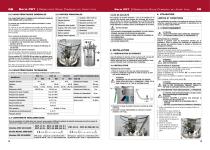
Serie PET | Réservoirs Sous Pression en Acier Inox LES CARACTÉRISTIQUES TECHNIQUES DES DIFFÉRENTS MODÈLES SONT DONNÉS DANS LA SECTION 2.3. Le réservoir est constitué de deux parties principales: le corps et le couvercle. Le corps de la cuve est équipée de six manette de blocage (quatre pour la version 10L) qui assurent la parfaite étanchéité du système et de deux poignées de levage qui facilitent les opérations de manutention du groupe. Sur le couvercle de fermeture sont situés: - La connexion d’entrée d’air avec son robinet (L); - La connexion de sortie du produit avec son robinet (D); -...
Open the catalog to page 10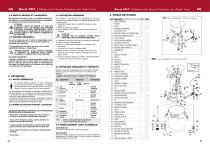
Serie PET | Réservoirs Sous Pression en Acier Inox 5.3 ENTRETIEN ORDINAIRE Pour maintenir en bon état tous nos appareillages et tous leurs composants on conseille d’effectuer un nettoyage méticuleux le plus souvent possible. 1. Décharger la pression selon les indications données au paragraphe 4.2. 2. Enlever le couvercle du réservoir. 3. Vider le réservoir de la peinture, ensuite y verser le solvant de nettoyage. Ce sont les risques que, pour la nature de l’appareillage et pour son bon fonctionnement, on n’a pas pu éliminer pendant la conception et la fabrication. Ce paragraphe décrit ces...
Open the catalog to page 11All ANEST-IWATA FRANCE catalogs and technical brochures
-
W 400
24 Pages
-
DPS series
126 Pages
-
TOF-5B/TOF-6B
16 Pages
-
WRA-101
4 Pages
-
WA-M 220
32 Pages
-
ws 400/ls 400
24 Pages
-
EXTERNAL CHARGE
6 Pages
-
W300 WB Retouch Spray Gun
1 Pages
-
W200 Manual Spray Gun
1 Pages
-
LPH 80
1 Pages
-
W400 WBX
1 Pages

